All-on-4 dental implant is an advanced full-arch rehabilitation method, performed by implanting 4 dental implants into the jawbone, which helps limit the number of implant placements and reduces swelling and pain after surgery. This is a popular fixed full-arch restoration technique, where the dentist places 4 implants as supporting posts for the full arch prosthetic. All-on-4 implants are especially suitable for people who have lost many teeth, an entire arch of teeth, or those who need a complete dental arch restoration, providing a more sustainable and cost-effective solution compared to traditional methods.
What is All-on-4 Dental Implant?
All-on-4 dental implant is a method of restoring a full arch of missing teeth by directly implanting 4 implant posts into the jawbone, which helps limit the number of implant placements, reduces swelling and pain, and shortens treatment time.
Full-arch tooth loss is a common condition in middle-aged individuals, primarily due to weakened oral health, leading to periodontal disease, making teeth loose, broken, and severely affecting eating and communication functions, as well as causing severe jawbone loss, significantly impacting overall body health.
With the All-on-4 technique, the dentist will place 4 implant posts for each arch, including 2 straight implants at the position of tooth number 2 and 2 angled implants at the position of tooth number 5, combined with a multi-unit abutment, typically applied to the lower jaw and allowing for a stable restoration of 12 teeth per arch.
Not only does it restore good chewing ability, but All-on-4 dental implant also helps maintain jawbone density, keeps facial structure stable, and extends the lifespan of the restoration.
If previously, individuals with full-arch tooth loss had to choose removable dentures or multiple costly and inconvenient implant placements, now, thanks to the remarkable development of dental technology, the All-on-4 full-arch implant solution has become the optimal choice – providing strong new teeth and significant cost savings.
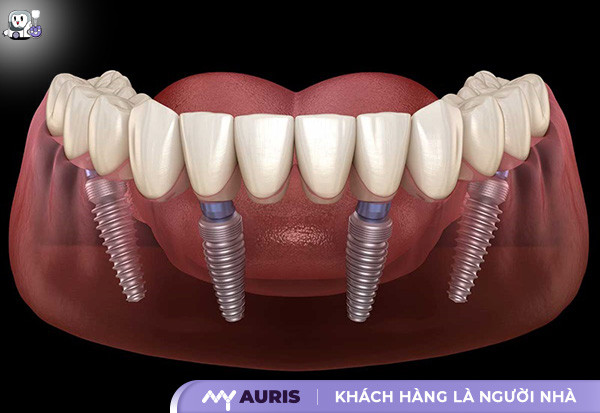
Advantages, Disadvantages, and Considerations for All-on-4 Dental Implants
Advantages of the All-on-4 Dental Implant Technique
All-on-4 dental implants use only four implant posts for the entire arch, thereby shortening surgical time and saving costs compared to placing multiple individual implants. This is a suitable solution for individuals with weak or atrophied jawbones, helping to restore chewing function often without the need for bone grafting.
The prosthetic arch structure is designed using CAD/CAM technology, ensuring stable occlusion and chewing force. Patients can use temporary teeth immediately after implant placement without waiting for complete bone integration. This helps improve eating ability quickly and avoids complications from prolonged edentulism.
Modern implant systems, typically titanium or premium brands like Nobel Biocare, have a high bone integration rate, good biocompatibility, and superior durability. The use of all-ceramic or zirconia crowns also enhances the aesthetic and durability of the restoration.
All-on-4 dental implants help patients regain their smile, boost confidence, and significantly improve their quality of life. This is a recommended option by many implant dentists for cases of long-term tooth loss, especially when a fixed restoration is needed and traditional methods are not viable.
Disadvantages of the All-on-4 Method
Despite its many advantages, All-on-4 still has some limitations. First, the treatment cost is not low; it is a significant investment, and patients need to be financially prepared.
Implant placement surgery requires a highly skilled dentist with extensive experience and supporting equipment such as a Cone Beam CT scanner. If performed incorrectly or at an uncertified facility, there is a risk of implant rejection or malocclusion.
Some cases may require delaying restoration if the jawbone condition is insufficient, or if the patient has uncontrolled systemic diseases like diabetes. Post-implantation care also requires strict adherence from the patient: no smoking, thorough oral hygiene, and regular follow-up appointments.
If proper hygiene is not maintained, the gum tissue around the implant can become inflamed, affecting the durability of the restoration. Additionally, replacing temporary teeth with fixed ceramic teeth must be done at the right time to ensure optimal bone integration.
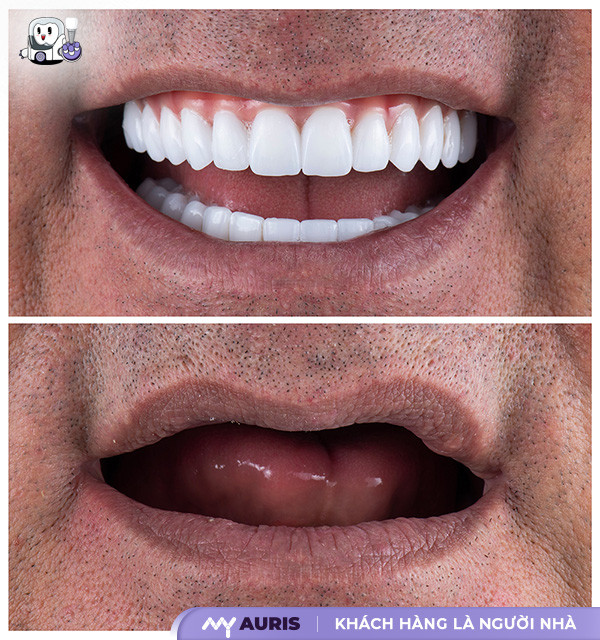
Who Should Consider All-on-4 Dental Implants?
Here are the groups of people suitable for this technique:
Individuals with Full or Nearly Full Arch Tooth Loss
If you have lost 10 or more teeth in your upper or lower jaw, especially if your chewing ability is significantly compromised, then All-on-4 implants are one of the optimal choices for full-arch tooth restoration.
Individuals Currently Using Removable Dentures But Are Dissatisfied
Traditional removable dentures can cause gum irritation, looseness while speaking, poor chewing ability, and may easily fall out when laughing loudly. All-on-4 implants overcome these limitations with a fixed prosthetic system, providing superior stability, improved chewing force, and facial aesthetics. With 4 titanium implant posts, you will have stronger new teeth and won’t have to remove them daily.
Elderly Individuals with Atrophied Jawbone But No Immediate Need for Bone Grafting
For elderly patients experiencing jawbone atrophy after prolonged tooth loss, placing individual implants can be challenging due to insufficient bone support. The All-on-4 technique utilizes the remaining bone in the anterior jaw – where atrophy is least severe – to place angled implants, thereby minimizing the need for bone grafting. This is a comprehensive implant solution, saving costs and shortening recovery time.
Individuals with Stable General Health
Before implant placement, the dentist will conduct a general health check. Those who do not suffer from severe conditions such as uncontrolled cardiovascular disease, unstable diabetes, or blood disorders will be suitable for this dental surgery. This is a basic requirement to ensure the safe and effective integration of the implant posts into the bone.
Individuals Desiring Fast and Minimally Invasive Restoration
Compared to traditional techniques, All-on-4 implants help patients recover faster due to fewer implants and a shorter treatment process. Often, within 24–48 hours, you can have stable temporary teeth for light chewing. This method utilizes modern CAD/CAM technology to design full ceramic dentures that are compatible with artificial gum tissue, ensuring both aesthetics and function.
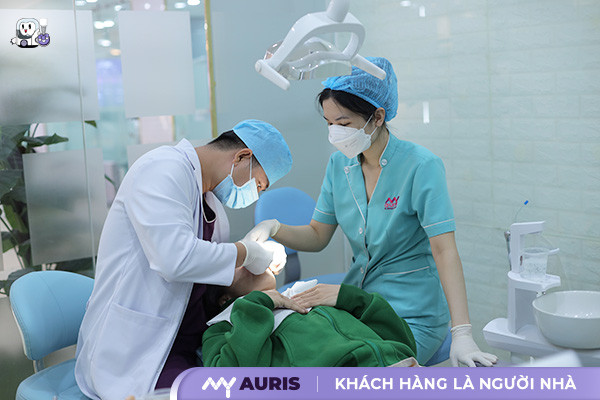
What is the All-on-4 Dental Implant Procedure?
To achieve optimal results, the implant placement procedure must follow specific steps under the supervision of a specialized implant dentist:
Step 1: General Examination and Cone Beam CT Scan
The dentist conducts an oral examination to check the condition of the gums, jawbone density, and any existing dental pathologies. This is combined with a 3D Cone Beam CT scan to analyze the jaw structure and assess the potential for implant integration.
If the jawbone is weak or atrophied, the dentist will consider an appropriate treatment plan, which may include jawbone grafting if necessary. Data from the scan will be fed into software to simulate the full-arch restoration technique according to personalized standards.
Step 2: Treatment Plan Design and Impression Taking
After clinical evaluation and radiographic imaging, the dentist will develop a treatment protocol based on:
- Position of 4 titanium implants
- Optimal angulation of implants for chewing force
- Prosthetic framework using CAD/CAM technology
Impressions of the patient’s arch are taken to fabricate temporary teeth, ensuring immediate fixed restoration after implantation.
Step 3: Performing the Surgery to Place 4 Implant Posts
The implantation process is carried out under strictly sterile conditions. The dentist will place 4 implant posts in the predetermined positions, with the two posterior posts being angled to optimize contact with the bone.
This technique helps avoid areas requiring bone grafting, especially in patients with severe bone atrophy. This is an advantage that shortens treatment time and increases the rate of personalized bone integration.
Step 4: Immediate Fixed Temporary Tooth Placement
Immediately after implant placement, patients are fitted with a fixed full-arch temporary prosthesis to ensure chewing function and aesthetics while waiting for the implants to integrate with the bone.
The temporary teeth are designed to be lightweight and fit snugly against the gums, helping to protect soft tissue and ensure no excessive pressure is placed on the implants.
Step 5: Monitoring and Regular Follow-up
Within 3–6 months, the dentist will monitor the healing process and the degree of implant integration. Patients are instructed on post-implantation care to prevent infection and maintain good oral hygiene.
Step 6: Placing Fixed Ceramic Teeth After Complete Integration
Once the implants have stably integrated, the dentist will place the fixed full-ceramic teeth onto the prosthetic framework. The type of teeth used can be zirconia or titanium-ceramic, depending on the patient’s needs and budget.
The final result is a strong, fixed prosthetic arch with chewing ability comparable to natural teeth, providing enhanced aesthetics and quality of life for the patient.
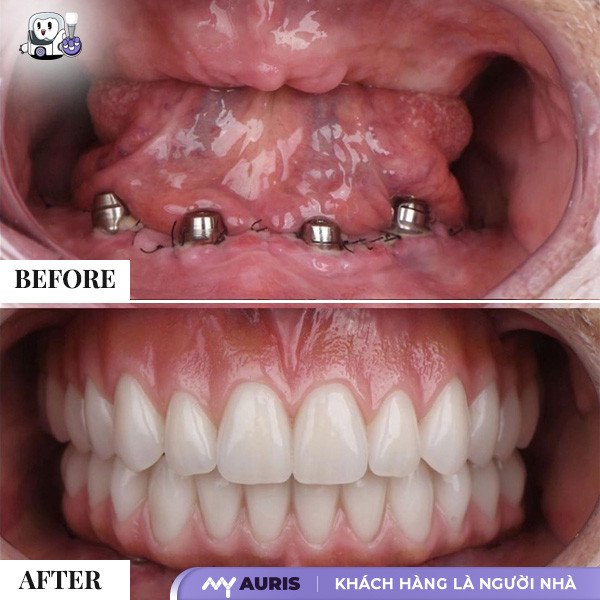
How Much Do All-on-4 Dental Implants Cost?
The cost of All-on-4 dental implants ranges from 75,000,000 to 250,000,000 VND (Vietnamese Dong), and the price may vary depending on the clinic, warranty policy, and promotions.
Reference Price List for All-on-4 Dental Implants in Vietnam
| Treatment Package | Price (upper or lower jaw) | Includes |
| Basic Package | 75 – 100 million VND | Korean implants, metal-ceramic crowns |
| Standard Package | 120 – 150 million VND | US implants (Dentium), all-ceramic crowns |
| Premium Package | 180 – 250 million VND | Nobel Biocare implants + zirconia all-ceramic crowns |
The cost of All-on-4 dental implants depends on many factors, and there isn’t a fixed price for all cases. To understand the pricing clearly, you need to be aware of the following core factors:
Number of Implant Posts Used
The All-on-4 technique uses only 4 implant posts per arch, but it cannot be applied in all cases. If there is significant jawbone loss, the dentist may recommend upgrading to All-on-6 to ensure stability. This will change the cost.
Type and Origin of Implant Posts
Popular implant types such as Nobel Biocare, Straumann, and Dentium have different price points. Implants imported from Europe are generally more expensive but offer faster bone integration, greater durability, and a higher success rate.
Material of Fixed Prosthetic Teeth
Prosthetic teeth can be made from metal-ceramic, titanium-ceramic, full zirconia ceramic, etc. The price varies depending on the chosen material. Zirconia crowns offer high aesthetics and great durability but come at a higher cost.
Current Jawbone Condition
If the jawbone is weak or atrophied, you may need jawbone grafting or sinus lift procedures before implant placement. These techniques incur additional costs and extend the recovery time.
Treatment Technology and Dentist’s Expertise
Dental centers utilizing Cone Beam CT scanners, CAD/CAM technology, and a team of specialized restorative dentists typically have higher prices, but in return offer enhanced accuracy and safety.
All-on-4 dental implants without bone grafting is a modern full-arch restoration solution, quickly restoring chewing ability and aesthetics for individuals with long-term tooth loss. To achieve the best treatment results and prevent complications during and after surgery, patients should choose a reputable dental implant clinic with a team of specialized dentists and adhere to the standard All-on-4 technical procedure. This not only ensures effective restoration but also protects long-term oral health.
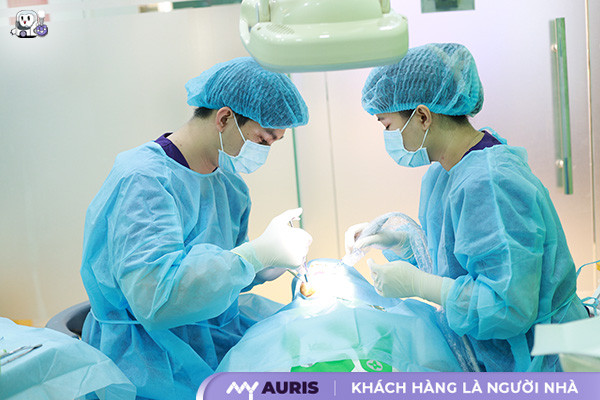
Reputable All-on-4 Dental Implant Clinic Address
All-on-4 is a fixed full-arch restoration technique using only 4 titanium implant posts, strategically placed in the jawbone. This method provides rapid, minimally invasive full-arch denture restoration, offering high stability and excellent chewing force.
Patients with full-arch tooth loss, or those who have lost many teeth and are not eligible for fixed bridges, or do not wish to use removable dentures. Specifically, All-on-4 is suitable for individuals with good jawbone density. In cases of insufficient jawbone density, the dentist will assess and recommend bone grafting before implant placement.
All-on-4 Implant Procedure:
Examination and consultation: An implant dentist with over 10 years of experience at My Auris will examine, take a Cone Beam CT scan, analyze the bite, and create a detailed treatment plan, including 3D simulation.
Implant placement: 4 titanium implant posts are placed into the jawbone.
Temporary tooth placement: Immediately after implant placement, you will be fitted with temporary teeth to ensure aesthetics and basic chewing function during the healing period.
Permanent ceramic tooth placement: After approximately 3-6 months, once the jawbone has fully integrated with the implants, the dentist will proceed with placing the permanent ceramic teeth, completing the dental restoration process.
My Auris Dental Clinic address: 11Bis Nguyen Gia Thieu, Ward 6, District 3, Ho Chi Minh City
The entire All-on-4 dental implant procedure typically takes about 3-6 months, including the healing period.
Only 4 implants for the entire arch, minimally invasive. No bone grafting needed in many cases. Immediate restoration. High stability, excellent chewing force. Natural smile aesthetics. Reasonable cost compared to traditional methods. High implant lifespan, up to 20 years or more with proper care.
Full-arch tooth loss severely impacts health and quality of life. All-on-4 dental implants at My Auris are an optimal solution to help you regain a confident smile, comfortable chewing, and an improved quality of life. Contact My Auris now for a free consultation and to schedule an appointment with an experienced implant dentist.





